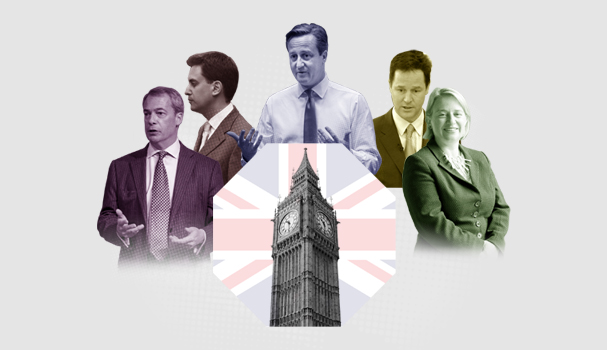Confidence among businesses all over the UK is on the up. SMEs are doing well and they want to keep it that way. With election fever heating up, entrepreneurs have a crucial decision to make as to which party, if any, best represents their interests.
Small business owners have been making it quite clear in recent months exactly what policies they want the next government to concentrate on in order to realise their goals, and it seems the parties have taken heed. Businesses in England pay higher rates than anywhere else in Europe and so rates as well as regulation reform are popular policies, as are tax simplification and help with finance. Whatever your preference, it is clear that everyone wants policies which are founded on long-term prosperity and a business environment that makes it easy for SMEs to plan and invest.
Just last month, every major party attended a debate at the ICAEW, organised by Enterprise Nation, to win the hearts of entrepreneurs. Although the Conservative Party came out on top by a significant margin, anything’s still possible. Which party do you trust to improve conditions for your business?

The Conservative Party
Win or lose at this election, Cameron’s coalition government will be remembered for many things. A recent publication by Cambridge University described the prime minister as ‘more radical than Thatcher; sexier than Blair’. Sexy or not, there may be some truth in the Thatcher remark as Cameron’s improvement of the economy from an historically weak position has come at a price. Austerity was damaging to many, not just those on the bottom of the scale, and some low and middle income earners are only now seeing any benefit from the recovery. The NHS suffered, although not as badly as some claim, but Britain’s legal system is in a mess and small businesses have cause for concern (see p91).
“We have a very clear plan: if we are re-elected, we want to make Britain the best place in the world to start and grow a business,” said Matthew Hancock, the business and enterprise secretary, at the ICAEW debate. Step one is tackling business rates. “When we came to office, the plan was to end small business rates relief and we have maintained it.” When George Osborne delivered his autumn statement last year, he announced that business rates relief will be doubled for a further year with discounts of 50%, meaning a possible £1,500 respite for 500,000 small businesses. In the final budget of the current government last month he confirmed that the government will carry out a review of business rates after admitting the system “has not kept pace with the needs of a modern economy”.
The Conservatives have lauded the transfer of power and budgets to cities in the North. Osborne’s budget also revealed something we have known about for some time: a “provisional agreement” to allow Greater Manchester to keep 100% of the additional growth in local business rates in a move intended to help create a northern powerhouse.
Similar to the Liberal Democrats, the Tories have hailed the Regional Growth Fund a great achievement and are in support of the proposed high-speed rail line between Manchester and Leeds.
The incumbent government – especially the Conservative contingent – are also intent on cutting regulation and won’t let red tape “get in the way” of doing business. Under this administration the UK has seen an additional 760,000 small businesses set up shop. “Our plan now involves not only making sure that we deal with the country’s debts but that we face up to the long-term problems, improving exports, making it easier to employ people,” Hancock says.

The Labour Party
All the established parties in Westminster have had a bit of a bad year. The Labour Party has seen its support drop, leaving it not much popular than it was at the time of the last election, and look how that turned out. Regardless, it has been consistently narrowly ahead in the polls and if elected – most likely in the form of another coalition – it says it will set up a US-style Small Business Administration (SBA). The body would assist entrepreneurs and small businesses. Labour has also committed to increasing competition in banking by bringing at least two more challenger banks onto the high street.
The party has committed to cutting business rates in 2015 and then freezing them in 2016 for over 1.5 million business properties, which shadow chancellor Ed Balls said would create a “fairer” tax system. Interestingly, despite all the furore over moral obligations to pay tax, the party has promised to keep corporate taxes “competitive” if it wins the election.
When it comes to red tape, Toby Perkins, Labour’s shadow minister for small business – himself the former owner of three SMEs – has promised small businesses “a regulatory framework you can trust”.
“An approach that says all regulation is bad is a cowboy’s paradise,” he explained. “We need to make sure that the regulations we have are actually useful, but if you don’t enforce those regulations once they exist, what you end up with is those compliant businesses being disadvantaged against those who don’t follow the rules.”
On the issue of late payments, Labour will “stand up for small businesses”. Labour also has no plans to raise taxes on SMEs.
Childcare is one of the major stumbling blocks for women re-entering the workforce, and costs have risen by 150% over the last decade. A recent study by the National Centre for Social and Economic Modelling, which is attached to the University of Canberra, found that tackling these costs would be a more effective way of boosting female participation than the current government’s paid parental leave scheme. It will be welcome policy for many that Labour pledged 25 hours’ free childcare for three to four year olds and would make primary school hours stretch from 8am to 6pm. Perkins says supporting women in work could be enough to single-handedly tackle the deficit.

The Liberal Democrats
The Liberal Democrats have spent much of the last year in single figures on the polls, which is their worst performance in nearly a quarter of a century. It’s no wonder party leader Nick Clegg says he can’t sleep at night over the party’s broken pledges on scrapping student fees. The main question business leaders need to ask is, ‘do the Lib Dems actually have any credibility left?’
If the answer is yes, you may be glad to hear that it has pledged to cut down on red tape. To tackle the uncertainty over regulations, the party is seeking to establish a Regulatory Advisory Board. Regulation should be designed in such a way as to promote low carbon and energy-efficient innovation, it has said.
The Liberal Democrats have said that they will review business rates, which are a “disproportionate burden” on small businesses, and look at finding alternatives.
Another hotly contested topic is how to close the gender pay gap, which under the current government has fallen to its lowest level, at just under 20%. The Lib Dems say this is still 19.1% too high and if they form part of the next government, this will remain a priority.
Between them, UKIP, the SNP and the Green Party have the support of more than a quarter of the electorate. But how do their business pledges hold up?

The Green Party
Despite popular belief, the Greens are pro-business. Details are still scant about their small business manifesto but it is clear the party recognises the importance of local enterprise. In fact, it would allow councils to impose extra rates on out-of-town supermarkets and the pot will be used to fund smaller local firms. A cut in rail and bus fares by an average of 10% would also help those firms using public transport.
The Green Party has promised to simplify PAYE by aligning the lower National Insurance limit with personal allowance and abolishing the upper limit. It is committed to ensuring that no contract with a self-employed person can pay below minimum wage, and to amending planning laws to allow appropriate small businesses to operate in residential areas and ensure all large and new retail developments include spaces for small and local businesses.
The main thing that sets the Green Party apart is its commitment to ending the policy cuts. The party spokesman on business, innovation and skills, Howard Allen, says: “We’re the only party that is anti-austerity; austerity has failed and was only meant to last for four years.” He adds that the Greens are committed to tackling the problem of living standards, introducing a living wage and reducing tuition fees “so that people can spend money in small businesses”.
As with all other parties, the greens recognise that regulation is a problem and will aim to help SMEs deal with it as well as providing tailored advice on energy efficiency. Other policies include providing help for small rural businesses and the introduction of a network of local community banks, which will provide “a new source of finance for small businesses”.

UKIP
If the Tories are the party of big business, UKIP thinks of itself as the party of small business, although judging by a recent poll of small business entrepreneurs at the ICAEW, very few are convinced by this rhetoric. UKIP’s small business spokesperson, Margot Parker, says that the small business community is burdened by massive regulation, particularly from the EU, and unnecessary costs. “Small businesses need to be able to become profitable and I know this is damned hard,” she says. “Our policies are geared towards getting rid of restrictive practices.” This would include simplifying planning regulations and licences for empty commercial property vacant for over a year and lowering taxation.
UKIP also wants to increase free local parking and look into how education can create a more skilled workforce. On late payments, Parker says that while a directive is in place, it doesn’t do enough to help small businesses. “If you’re doing work for the larger companies, it’s the big boys that have the political and financial muscle to hold back payments.” She describes 60 days as an “outrageous” amount of time to wait to get paid and pledges change and adds that the cost of small businesses taking large businesses to court is much too high.
The real litmus test for voting UKIP should be their flagship policy of leaving the EU. “Fewer than one in ten British businesses trade with the EU, yet 100% of them must comply with thousands of EU laws,” Parker says. “This burden is destroying small businesses and therefore helping to destroy our economy.”
For the first time in electoral history, SMEs have found a prominent place on the political agenda. With the two main parties neck and neck, any party could form part of the next administration. Whoever you vote for, it is important we all hold the next government to its promises on small business. ![]()
Share via:


















































